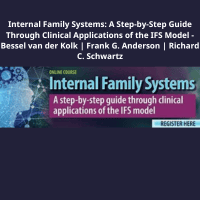Course Summary:
This comprehensive course, led by pioneers in trauma and psychotherapy Bessel van der Kolk, Frank G. Anderson, and the founder of the IFS model Richard C. Schwartz, provides a step-by-step guide to the clinical applications of the Internal Family Systems (IFS) model. IFS is a powerful and transformative approach to psychotherapy that views the psyche as comprised of multiple “parts” or subpersonalities. This course offers practical strategies and techniques for therapists and clinicians to effectively utilize the IFS model in their work with clients. It emphasizes understanding the different types of parts (e.g., exiles, managers, firefighters), accessing the client’s “Self” (the core of wisdom and compassion), and facilitating healing and integration within the internal system. The course bridges theory and practice, offering concrete methods for applying IFS principles to a wide range of clinical issues, including trauma, anxiety, depression, and relationship difficulties.
Target Audience:
This program is designed for:
- Psychotherapists, counselors, and social workers
- Psychiatrists and psychologists
- Trauma therapists
- Mental health professionals seeking to expand their therapeutic toolkit
- Individuals interested in a deeper understanding of the IFS model for personal or professional development
Main Content:
The course likely covers key areas such as:
- Introduction to the IFS Model: Understanding the core concepts of parts, Self, and the internal system.
- Identifying and Understanding Different Types of Parts: Learning to recognize and work with exiles, managers, and firefighters.
- Accessing the Self: Techniques for helping clients connect with their core Self of compassion, curiosity, and calmness.
- Working with Exiled Parts: Strategies for understanding and healing parts carrying pain and trauma.
- Working with Manager Parts: Techniques for addressing controlling and protective parts.
- Working with Firefighter Parts: Methods for understanding and regulating impulsive and reactive parts.
- The Process of Unblending: Helping clients differentiate from their parts and access the Self.
- Facilitating Internal Attachment and Harmony: Guiding clients towards greater internal understanding and integration.
- Applying IFS to Specific Clinical Issues: Practical applications of the IFS model in treating trauma, anxiety, depression, eating disorders, and relationship problems.
- Step-by-Step Clinical Techniques and Interventions: Concrete tools and strategies for implementing IFS in therapy sessions.
- Case Studies and Demonstrations: Illustrative examples of IFS in practice.
Without the specific sale page content, this summary is based on the likely topics covered in a clinical application course on the IFS model by these renowned experts. If you can provide the sale page link, I can refine the summary further.
Integrate the transformative power of IFS into your clinical practice!
SIGN UP NOW









